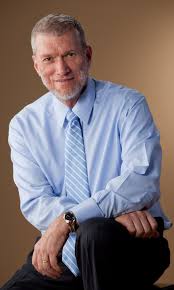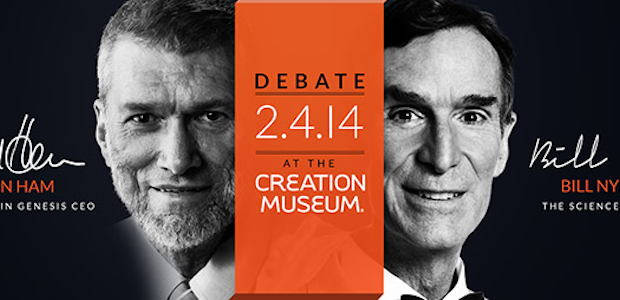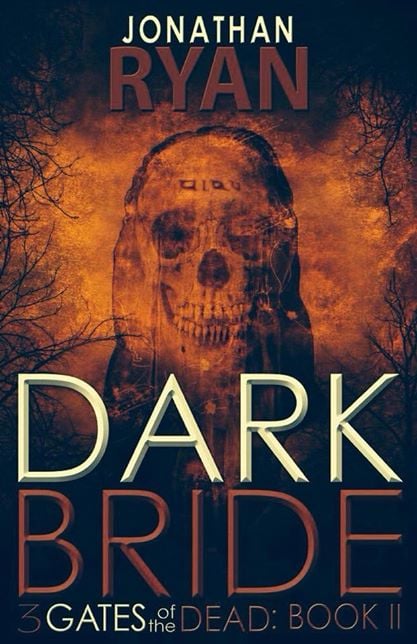(A few years ago, I visited the Creation Museum with a large group of atheists (that’s a story for another day). Needles to say, the experience was interesting. On one hand, I was impressed with the production value of the museum. On the other, as a Christian, I cant agree with Ken Ham, his view of the bible or his cultural war mentality. Still, this is America and everyone has a right to present their views without edits. What you see below in the full on, unedited version of Ham’s answers on the museum and his upcoming debate with Bill Nye. Read. Reflect and present intelligent discussion below. Plus, I mean, he does have a killer beard….)
When did you start becoming interested in the questions of science and faith?
I was brought up in a Christian home in Australia with a father who was very bold about his faith. People often challenged him concerning supposed contradictions in the Bible or other alleged problems with the Scriptures and Christianity. My father would carefully study the issues so that he could answer the critics. I was brought up in a home environment where I was taught to think critically and was encouraged to seek answers to questions about my faith.
When I went to high school in Australia, I was exposed to textbooks that outlined evolutionary ideas—such as ape-like creatures turning into people. I recognized the conflict between evolutionary ideas and a literal reading of the book of Genesis. I set out to think critically about these issues and to understand the nature of science. That included recognizing the difference between interpretations of the evidence we have from the unobservable past and what we could actually directly observe and then repeatedly test. I was able to find resources from around the world that helped me understand the origins issue and the nature of science, and saw the many problems with evolutionary ideas. At the same time, I learned how defend the historical narrative of Genesis using observational science.
In the 1970s I became a public school science teacher in Australia. With my background, I didn’t accept evolutionary beliefs, as they clearly contradicted the Bible. In one of the first science lessons that I taught, a teenager asked me how I could even be a Christian because, he claimed, the Bible wasn’t true. I asked him how he knew that, and he pointed to the evolutionary material in our textbook. At that point, I began to see more and more how the teaching of evolution was a stumbling block to students even considering the claims of Christianity.
Also, when I took my students to natural history museums, they saw many exhibits that were from an evolutionary perspective. This experience contributed to my intense burden to research and teach on the topic of origins and biblical authority.
It was also at that time that I developed a concern about the Christian church. I saw that it was being undermined by evolutionary ideas. Such beliefs about the past undermined biblical authority. I do believe the Lord put a “fire in the belly” to start an organization to present the scientific and biblical evidence to children and adults that confirms what the Bible teaches in Genesis chapters 1-11. Those chapters are foundational to all doctrine including the gospel. It was at that time that I envisioned building a creation museum one day, and I soon started a creationist organization.
 2) Many people don’t know about the fossil collection at the museum. How did you come up with the idea and where do you collect your specimens?
2) Many people don’t know about the fossil collection at the museum. How did you come up with the idea and where do you collect your specimens?
By any standard, we have a very impressive fossil collection. Now, it’s certainly nowhere near the quantity of the Smithsonian or other leading museums, but the quality is equal or better in some instances. Even a reporter with the New York Times who visited when the museum opened in 2007 commented about the quality of some of our fossil displays. By the way, this coming Memorial Day weekend, we’ll be exhibiting a world-class fossil—several bones of an allosaur, including the dinosaur’s skull, which is more than 90% complete. This is not a cast or a replica. It’s one of the four or five best allosaur skulls in the world.
The Creation Museum uses fossils to present evidence that there was a global catastrophe, Noah’s Flood, that killed and preserved the remains of creatures all over the earth. The fossils that we display throughout the museum are a testimony to the reliability of the Bible’s account of the Flood in Genesis chapters 6-9. Most of the fossils at the Creation Museum have been donated.
3) Why did you challenge Bill Nye to a debate, and do you believe this is the best way to educate people on the origins question?
In the summer of 2012, Bill Nye posted a video to YouTube where he shared his belief that teaching children against evolution was not appropriate and counterproductive in society. It has been viewed by over 6 million people, and became something of an internet sensation. Well, I posted my own YouTube video in response, as did two of our PhD scientists. These YouTube videos created such a stir that a reporter with the Associated Press contacted us for an article he was writing about the YouTube videos. During the course of the AP interviews, one of our staff members suggested to the reporter that when he spoke to Mr. Nye again, to please ask whether Mr. Nye would be open to a public debate on evolution and creation. Mr. Nye told the AP reporter that as long as we covered his expenses, he would do so.
Because the creationist view of origins is largely censored from our schools, museums, and the media, I look at this debate as an excellent opportunity for our voice to be better heard. The interest in the debate has far exceeded our expectations. We expect hundreds of thousands of people to watch live at debatelive.org, and tens of thousands of others may watch it later online or on DVD. Other than our Creation Museum’s grand opening six years ago, this may be the most-covered evolution/creation event in recent memory. The fact that the world’s media have been reporting on this debate suggests that we have a wonderful opportunity to present the creationist message to people around the globe, most of whom have never heard the case against evolution and the evidence that confirms creation.
4) You’re taking a lot of flak recently for saying that “liberal” Christians are a huge part of the problem when it comes to the Science/Faith debate. Why did you believe that statement was needed?
First of all, it needs to be understood that we are not saying that salvation is dependent upon what you believe about evolution, the age of the earth, and so on. Salvation is conditioned on faith alone. However, we are emphatic that taking ideas from outside the Bible (such as billions of years and molecules-to-man evolution) and using them to reinterpret God’s Word is a major authority issue, as it puts fallible man’s words in authority over the Word of God. It’s also a gospel issue in the sense that when Christians allow for millions of years of fossils before humans, that means death, disease, thorns, suffering, and bloodshed existed before sin! It would also mean God calls diseases like cancer, which some bones in the fossil record exhibit, is “very good.”
Our ministry is much more than just a creation/evolution outreach. We position ourselves first and foremost as a biblical authority ministry. AiG wants to show people that all of the Bible can be trusted, from Genesis to Revelation. Yes, there are different types of literature used in the Bible. The Psalms, for example, are poetic. But readers of the Bible need to take God’s Word according to the literature of the book they are reading and its context. Genesis is written as historical narrative and is cited as such throughout the Bible, including by Jesus, the God-man, in Matthew 19, where He stated that the reason marriage is one man and one woman is based on the creation of one man Adam, and one woman Eve in Genesis.
In our era, the book of Genesis has become the most-attacked book of the Bible. If you say the Bible can’t be trusted in its first chapters of history, then the questions is: can it really be trusted elsewhere, including what it says about Christ’s salvation message in the gospels? The gospel is founded in Genesis, where we have the origin of sin and death and the need for a Savior (Genesis 3). Theologians and pastors who pick and choose what they want to believe about the Bible are creating massive doubt about all 66 books of the Bible. If people, after hearing what these theologically liberal Christians are teaching, choose not to believe that the Bible is God’s Word, such an attitude will have eternal consequences for those who reject the Bible’s messages. Sadly, too, we are seeing an exodus of young people from the church by the time they reach college age. Many of them have succumbed to doubt and unbelief because the authority of the Word beginning in Genesis has been undermined.
5) How do we forge a new way forward in the evolution/creation debate?
Looking forward, I hope my debate with Mr. Nye will create a bigger spotlight on the whole creation vs. evolution debate and to the Word of God and its gospel message. The debate will help point out that there is significant dissent in the scientific community about whether or not molecules-to-man evolution is a true explanation of origins. Yes, creationists are a minority in the scientific and engineering world. But the majority has been wrong about many matters over the centuries; a majority-held position shouldn’t be used as a judge of truth. The creation movement is a growing one. Events like our debate can create better awareness of the important issue of origins and get more people talking, not only about origins, but the reliability of the Word of God and its message of salvation (Romans 10:9).
At the very least, our country needs to hear the problems with the evolutionary belief system and not have its challengers censored in our schools and museums. What is wrong with presenting people both sides of an issue, and encouraging students to think critically about origins? Secularists have been able to pass legislation that protects the teaching of atheistic evolution (atheism is naturalism) in the public school systems. As I have personally seen time and time again, this has great consequences on the lives of students. If these young people believe they are only animals and that there is no God, then who determines right and wrong? What is the purpose and meaning of life? Surely students have a right to be allowed to think critically about an issue that affects their whole view of life?












